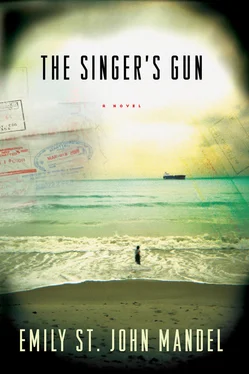Anton wore a bright uniform and carried suitcases and came home exhausted at the end of the day, made good tips sometimes from the English-speaking tourists. He worked hard and spent time with the cat and studied Italian in his room at night, reread the books in his slowly growing library, tried not to think too much about anyone he loved.
At first he kept Jim indoors, but the cat gazed at the seagulls with such undisguised longing and the improvised litter box on the balcony was becoming a problem, so Anton took Jim out on the beach one evening. Jim moved close to the sand at first, hissing at rocks and trying to look everywhere at once, but then he gradually relaxed enough to begin pouncing on seashells.
He took Jim down to the water early in the morning and then again late at night, when everyone was sleeping and the ocean was his. The cat was orange in daylight, pale in the moonlight. He stalked Anton’s shadow and dug for things in the sand. Anton would sit on a rock and watch him or look at the water. When Anton stood up and began to walk along the shore the cat came with him, never very far from his feet, executing complicated maneuvers in his lifelong efforts to catch his own tail.
The cat slept in a far corner of the bed, curled and independent, although he sometimes stepped on Anton’s chest to wake him in the morning. Anton always woke unpleasantly, sick with memories of gunshots. Most of his dreams involved people disappearing into thin air: alone on the abandoned dream island he wandered from house to house and then out to the empty piazza, the silent beach. Out onto the pier where the abandoned boats bobbed gently in the dead sea, through abandoned houses, abandoned cafés, the abandoned restaurant with four chairs and a bottle of wine set up at a table, the whole abandoned dream landscape suffused with dread.
Elena was back on Ischia at the beginning of April, standing pale on the threshold when Anton opened the door. It was an ordinary evening after working the day shift at the hotel two towns over, and Anton hadn’t changed out of his uniform yet. He’d been drinking an Orangina and reading La Repubblica at his desk, stopping to look up the occasional word. There was a soft knock on the door just before midnight and Anton thought everything was over. He stood up, straightened his jacket, and opened the door with tremendous formality, expecting either the Italian police or a thug with a gun or David’s sister or some combination of the above. Elena stood for a moment like an apparition before she fell into his arms, or tried to; her body got in the way. Holding her was awkward. She was immensely pregnant. It was night and she had been traveling for hours. She sank down on the bed and closed her eyes for a moment and didn’t answer right away when he asked if she was all right. He asked if she was sick and she said no, just tired, but her tiredness had taken on the force of illness. She trembled and her hands were cold.
“I’ve missed you so much,” she said. “I’m so sorry I left.”
“Shh. Shh. It’s okay. Are you hungry?” She nodded. He brought her spaghetti and calamari from the restaurant downstairs, which had just reopened that week — the tourists were coming back to Ischia, a slow but widening trickle that would become a torrent by June. He gave her the plate and asked where she’d been, but she was too tired for coherence. She’d gone immediately to France because she spoke the language, and then she’d spent the winter moving slowly through the country in the cold and the rain. Working odd jobs here and there, trying to decide whether to come back to Ischia or not.
“I was afraid you might have gone home to the north,” he said. “I thought I might never see you again.” He held her close and she rested her head on his shoulder. “Don’t you miss your family?”
“More than I can say,” she said. “But if I go home to the north pregnant I’ll never leave again. I’ll be like my sister and just get stuck there forever.”
She drifted off in the middle of a story about a grand hotel in Marseilles where she’d worked in the laundry room, woke seconds later from a dream about snowmobiles and said, “He knew where I was from.”
“What?”
“People from the south, you tell them you’re from the far north and they think you grew up in an igloo, but he knew what it was like up there. Can you believe he’d actually been to Inuvik and Tuktoyaktuk? It’s so dark up there,” she said. “It was cold in Paris in January, but I kept thinking, I could be up there . Where it’s dark and there’s nothing. The sun doesn’t even rise in the winter. You live by moonlight for weeks.”
“Ellie, you should rest.”
He took the plate of spaghetti from her hands, set it on the desk behind him. She was slumped over on the edge of the bed. He knelt before her and began unbuckling her shoes.
“You kept the painting,” she said. She was looking up at the small painting of David and Evie, propped up against the wall on top of the desk. Elena’s shoes were stylish, red and shiny like lipstick, and the left buckle was somehow stuck. Anton struggled with it while she talked. Her feet were swollen. “You wouldn’t think a night could last that long,” she said. “My sister won’t talk to me anymore, did you know that? I don’t even know why. I think it’s because I left her there. I used to call her from New York City, and she wouldn’t come to the phone. .”
“You should rest,” Anton murmured. “You’ve been traveling too long.”
The case had gone cold, all loose ends and questions. Anton’s parents wouldn’t admit that Anton was missing, let alone that he was dead, which meant there wasn’t even a missing-persons case, and Aria had yet to resurface — in candid moments Broden thought the odds of apprehending Aria were relatively slim, given that the woman made passports for a living — which meant there wasn’t actually much of a false-documents case either. Aria’s one and only known associate — a man whom she’d met once in front of her apartment building, who’d been overheard mentioning a pickup at the docks at Red Hook on the day Broden had last spoken with Elena and who had said nothing interesting since — was followed for three uneventful months until Broden’s supervisor decided that trailing him was a waste of manpower. The girls who had survived the shipping container languished in an immigration facility upstate, awaiting their hearings. They knew very little about the people who had imported them to New York, and they didn’t know the name of the girl who had died. Efforts to track the origins of the container had gone nowhere; the company that had paid for shipping turned out to be a shell corporation in Estonia, its corporate address an abandoned post-office box.
Broden’s director agreed that the case had stalled, and Broden’s days were far too long and too frantic. No one had time for hopeless cases. But she was attending a conference in Geneva that April and it was a small matter to extend the trip by two days, to fly south to Rome and board a silver train at Termini and follow a story about a cat down the coast to Naples, where she paid a taxi driver to take her to the docks.
She bought a ticket for Ischia and boarded the next ferry. At the very least, she told herself, it’s a day on a beautiful island. But her next thought was that it was yet another day without her daughter and her throat tightened. When she’d emptied her jacket pockets to pass through airport security she’d found a blue plastic barrette; she’d carefully removed it from her sleeping daughter’s hair some months ago and it hadn’t left her pocket.
“You’re never here for her,” her husband had said as she was packing for Europe, and Broden couldn’t deny the accusation. Her work required long hours. There were days when she left for work before Tova was awake and came home after Tova had gone to bed. The child had turned seven while Broden was in Geneva.
Читать дальше





![Ричард Деминг - Whistle Past the Graveyard [= Give the Girl a Gun]](/books/412176/richard-deming-whistle-past-the-graveyard-give-t-thumb.webp)






